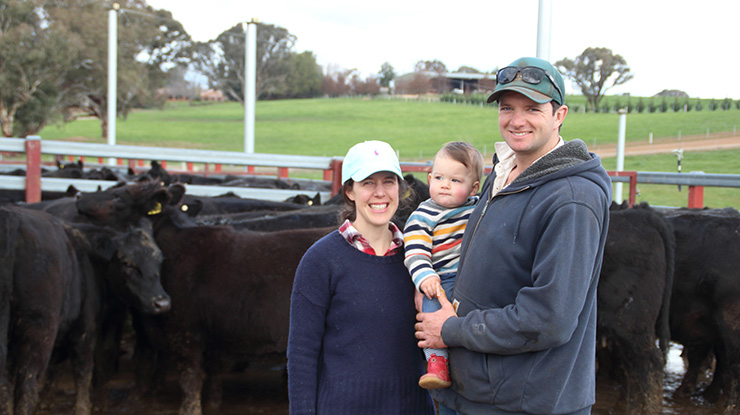Strategic grazing for success
08 October 2020
 Isabel, Henry and Stuart Tait.
Isabel, Henry and Stuart Tait.
In MLA’s ‘Down the track’ series, we catch up with producers who have been profiled in the past to see how their business is evolving in response to new challenges and opportunities.
Looking back
In 2017, NSW beef producer Stuart Tait embarked on an MLA‑supported Nuffield Scholarship to learn more about dual‑purpose cropping. He’s used the knowledge gained on his travels to sharpen his focus on grazing management and benchmarking and, as a result, intensify production on his family’s property. Stuart Tait shared his Nuffield Scholarship insights in the February/March 2018 edition of Feedback magazine.
Looking ahead
Adaptation is the name of the game for Stuart Tait, who changed tack along his Nuffield Farming Scholarship journey to gain more from the experience.
The Nuffield program provides recipients with a scholarship to travel overseas and study an agricultural topic of their choice.
Stuart’s original research topic was dual‑purpose cropping and beef cattle, but once he began travelling he quickly realised Australia’s expertise in this area was already world‑leading. So, he broadened his focus to look at whole finishing and forage‑based beef systems.
This opened his eyes to new grazing management options and enterprise mixes, as well as how to analyse a business through internal benchmarking and data collection.
These strategies now form part of the business Stuart runs with his wife Isabel and parents John and Joanna.
“Nuffield wasn’t something where I came back and just tipped the whole business upside down,” Stuart said.
“The real value was having the time away from the business and interacting with a lot of very smart people.
“When you’re not elbow‑deep working in it day to day, you start to think about your business from a different perspective.”
Strategic grazing
Stuart used the scholarship to visit dairy farms in England, Ireland and New Zealand. He was struck by how these producers measured, monitored and managed their grass resources to maximise utilisation.
He drew on these principles to find balance in his beef business through rotational grazing. He subdivided paddocks, increased mob size and began to move stock more frequently.
Stuart said a benefit has been getting a better handle on what feed is available so it can be better managed.
The chance to take a closer look at how producers around the world structure their enterprises prompted Stuart to ramp up productivity.
The Taits have increased their cropping area as well as livestock numbers – by growing more grazing crops, they’re effectively ‘stacking’ their enterprises.
Stuart said he now has a better understanding of what constitutes an acceptable return on assets.
The Taits conduct internal and external benchmarking to understand the profitability of their enterprises and to identify opportunities to improve overall business performance.
This has resulted in refocusing their cattle enterprise. When they realised beef breeding was their least profitable enterprise, they intensified their focus on trade cattle.
Breeding still has its place in the Taits’ business, to utilise some hilly country which isn’t well suited to running trade steers. The breeding enterprise also provides stability from a risk perspective.
Market uncertainty
An excellent start to the season this year reinforced the Taits’ decision to intensify production and they’ve capitalised on the seasonal opportunity to purchase steers, despite record‑high prices.
“We’ve spent a lot of money on buying cattle and with that comes greater risk – there are also market uncertainties with coronavirus and so on,” Stuart said.
“But we thought – here’s an opportunity, let’s go hard.”
Against the backdrop of COVID‑19, global politics, drought recovery and restocking, Stuart said he’s given up guessing what the market will do.
“The beef market has, in our opinion, never been harder to track or predict.
“There have never been this many variables pulling the market in so many different directions.
“We’ve tried to eliminate some of this risk with forward contracts, but we’ve really struggled to find them. Forward contracts are something I’d like to see more of, from a risk management point of view.”
Sharing the true story of beef production
Stuart is a passionate advocate for the beef industry, with representative roles with the NSW Grasslands Society and the Grasslands Society of Southern Australia.
He’s also shared his family’s beef production story as part of MLA’s Good Meat initiative to educate the community about animal welfare, environmental sustainability, health and nutrition.
He believes it’s important for producers to tell their story firsthand, to demonstrate their commitment to best practice and continual improvement.
“The squeaky wheel gets the oil, and there are a lot of squeaky wheels saying things about the red meat industry which aren’t positive.
“There are a lot of great businesses which have something to offer by opening up and showing others what they’re doing – as an industry, we need to share our stories and get the truth across."


